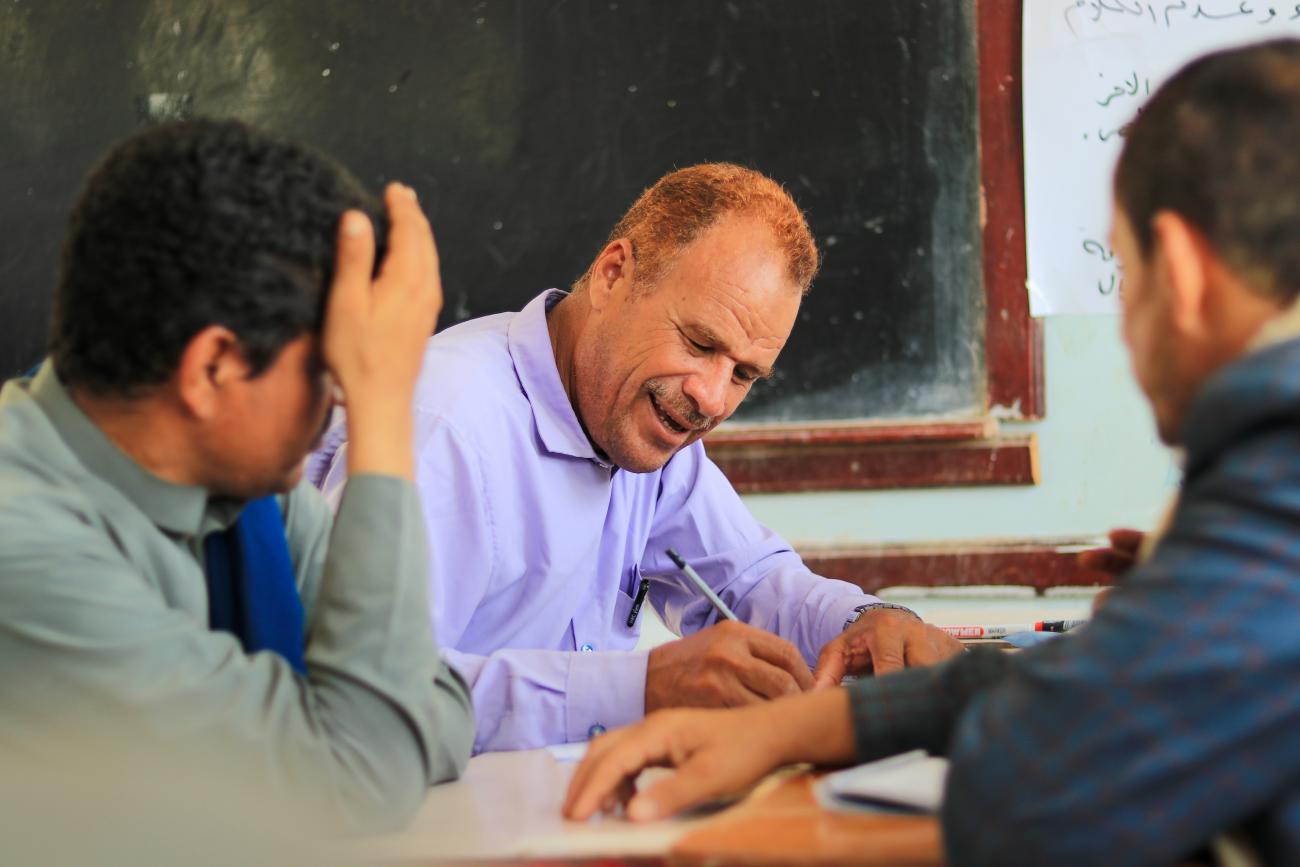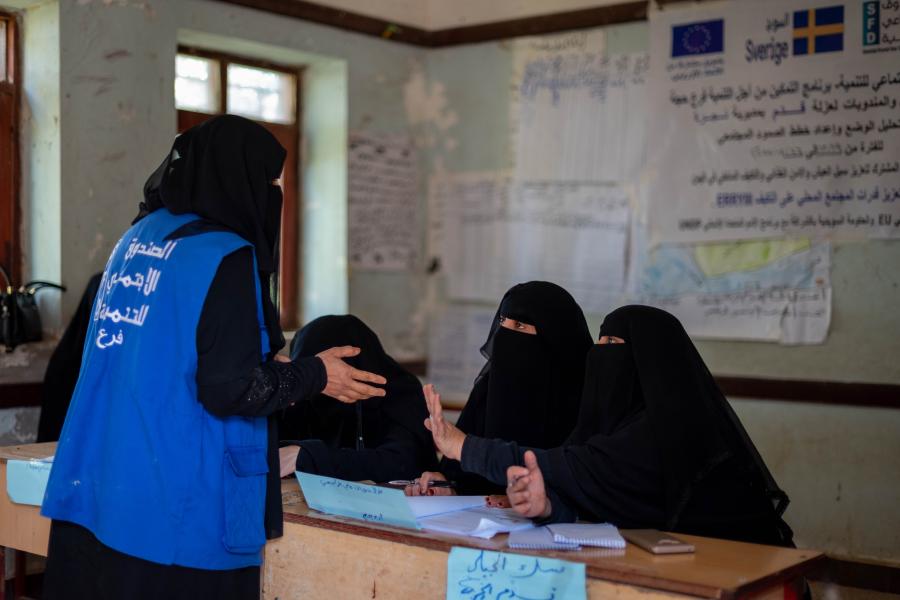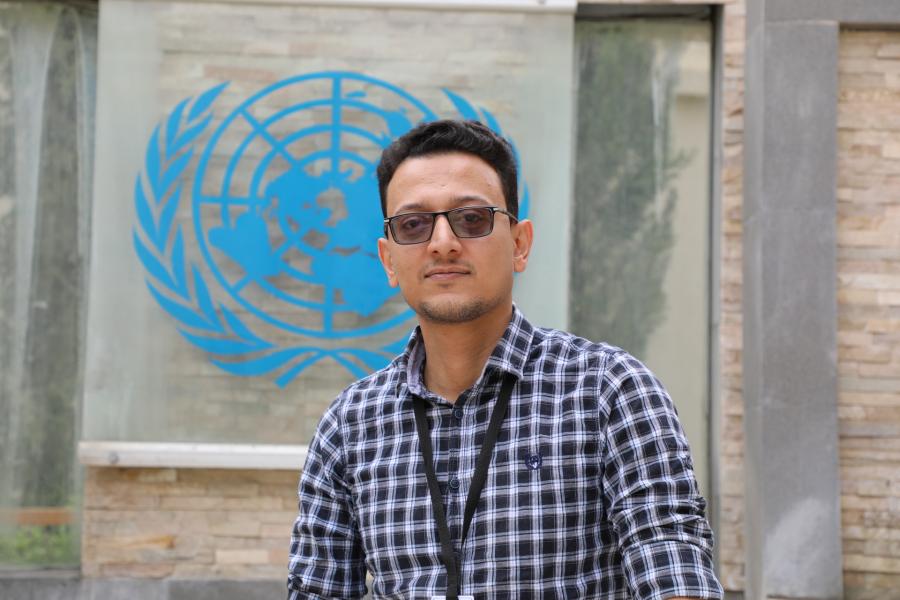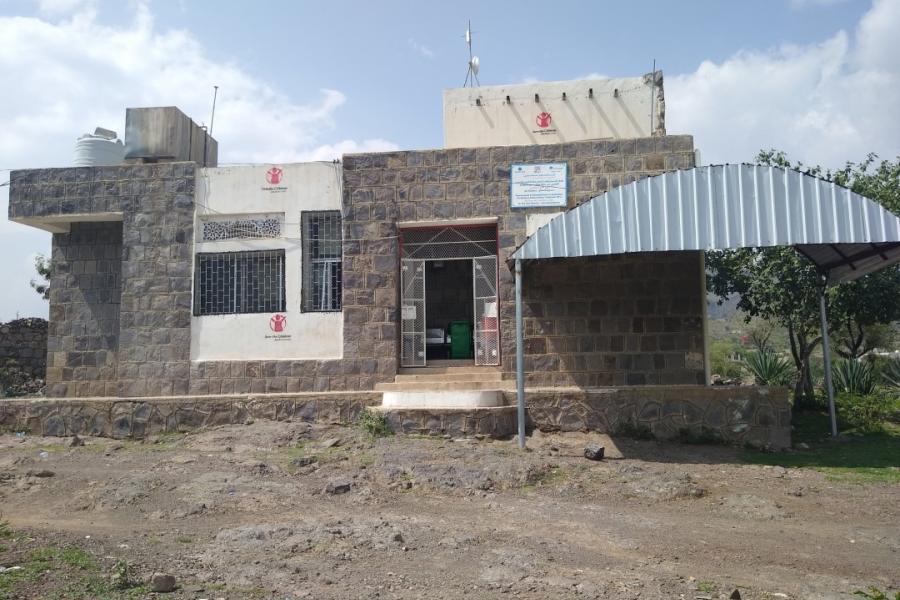UNDP Yemen: Building bridges: Mediation and dialogue bring communities together in Yemen

-
Strengthening local government resilience and communal conflict resolution supports the social fabric of Yemeni communities.
Against a backdrop of conflict and fragility, Yemen’s social services remain in critical condition, livelihoods have been lost, and trust building between local authorities and communities is vital.
In rural Yemen, access to electricity, water, education, and healthcare is limited, while a lack of job opportunities, a shortage of services and competition over resources can lead to conflict within previously close-knit communities.
If Yemen is to build long-term resilience, it is vital that communities are equipped to tackle challenges. Recognising this, the Supporting Resilient Livelihoods, Food Security and Climate Adaptation in Yemen Joint Programme (ERRYJP III) supported by the European Union and Government of Sweden has made it a priority to strengthen resilience of local institutions and communities.
With a budget of $49.3 million, the project will run until February 2025 and is expected to benefit approximately 850,000 people – though infrastructure and local asset rehabilitation, community dispute resolution, and measures to enhance social cohesion.
Supporting resilience and social cohesion in Yemen: A bottom-up approach

Acknowledging the critical role of local governance in promoting social cohesion and public service provision, unity and societal well-being, ERRYJP III has adopted a bottom-up approach that aims to boost the abilities of rural communities to better manage local risks and shocks through increased resilience and self-reliance.
Through resilience building and conflict resolution, the programme seeks to empower communities, providing the skills to address their own needs, and bringing people together in the process. This approach promotes community participation, the ownership of assets and the involvement of local authorities in identifying and implementing community-driven solutions. ERRYJP III also offers grants in order to implement small-scale initiatives and help resolve service-related issues.
With the formation 49 Sub-district Development Committees (SDCs), communities organized themselves into informal frameworks, with men, women and various societal groups coming together to address challenges collectively.
This has not only strengthened the social fabric of Yemeni communities but has also created a sense of ownership and responsibility among community members, inspiring them to contribute to various initiatives and projects that serve the needs of Yemen’s most vulnerable groups.
From conflict to cohesion: A young economist becomes a peacebuilder in Yemen

In the bustling city of Taiz, Abdul Rahman Al-Mahfadi, an economics graduate and teaching assistant at Taiz University, found his true calling as a community activist – something that began with a life-changing opportunity.
Enrolling in a training programme facilitated by the Social Fund for Development, as a part of the ERRYJP III Project, Abdul Rahman found himself learning how to build bridges through an intergroup dialogue approach.
During the immersive five-day training, Abdul Rahman delved deep into the concept of social cohesion, learning invaluable techniques around arbitration, mediation, and the process of managing community dialogues. Training on mediation and conflict included over forty per cent women participation, ensuring gender representation during communal dialogues. This empowers women to take on a decision-making role in their communities.
Motivated by these newfound skills, Abdul Rahman and his fellow trainees joined forces to establish a committee of mediators comprising members from SDCs and influential community figures. Equipped with conflict analysis tools and survey skills, the committee quickly identified which disputes were a priority, employing various conflict resolution techniques to tackle local problems – with community dialogue always at the forefront.
From closure to continuity: The power of dialogue in restoring healthcare services in Taiz

Access to healthcare is a challenge in Yemen, particularly in rural areas. The health centre in Al-Jabziya, a rural sub-district of Taiz with a population of around 18,000, caters not only to the healthcare needs of Al-Jabziya, but neighbouring villages too.
The health unit faced many challenges, with multiple community conflicts at the heart of its problems. Without a wall separating the land around the health unit, some community members wanted access rights to a local market, while others wanted to use the land as a burial site. The disputes between those opposed to the construction of a perimeter wall and the health director who wanted to secure the facility, ultimately forced the closure of Al-Jabziya’s health centre, depriving citizens of vital services.
Eventually, the mediation committee stepped in. They highlighted the importance of finding a solution to the conflict and pointed out the value of a community approach in which each voice is heard. While the different parties initially struggled to understand other perspectives, the mediators encouraged respectful communication, empathy and dialogue. Ultimately, they reached a “win-win” resolution, with an agreement to build a protective wall for the health unit, allowing services to resume, while safeguarding the interests of the local people.
“I have now become aware of the power of dialogue as an effective tool for addressing conflict,” declares Abdul Rahman.
Three disputes related to roads, education, and health, have now been successfully resolved in the Al-Jabziya sub-district of Taiz through interventions from the ERRYJP III Project.
Through its inclusive and participatory approach, the project has brought communities together, restored trust, and empowered individuals to repair the social fabric of their communities.
***
Funded by the European Union and the Government of Sweden, the Supporting Resilient Livelihoods, Food Security, and Climate Adaptation in Yemen Joint Programme (ERRY III) is a 3-year programme jointly implemented by the United Nations Development Programme, the World Food Programme, the International Labour Organization, and the Food and Agriculture Organization. The joint programme aims to reduce vulnerability and strengthen the resilience of crisis-affected communities in Yemen by creating sustainable livelihoods and improving resilience, food security, and access to basic services in five governorates in Yemen: Hajjah, Hodeidah, Lahj, Abyan, and Taiz.


